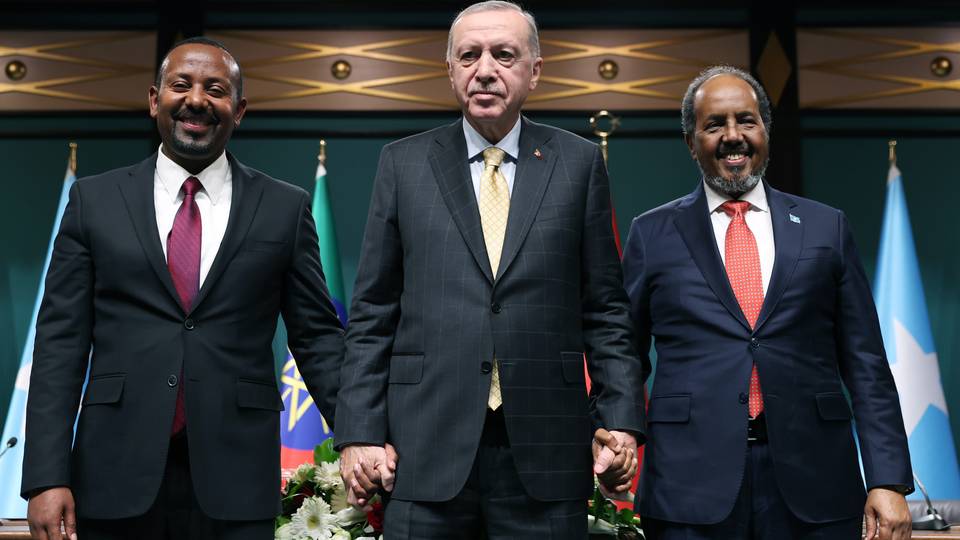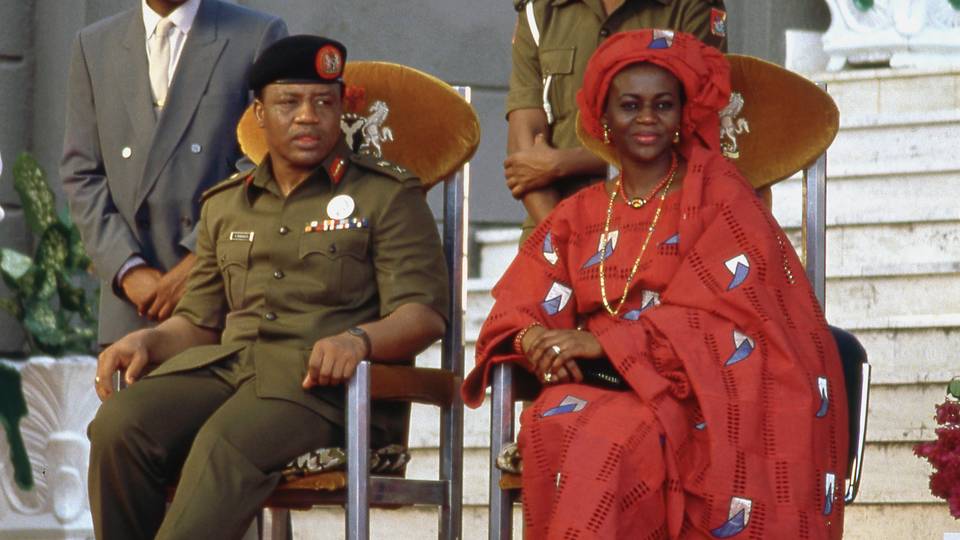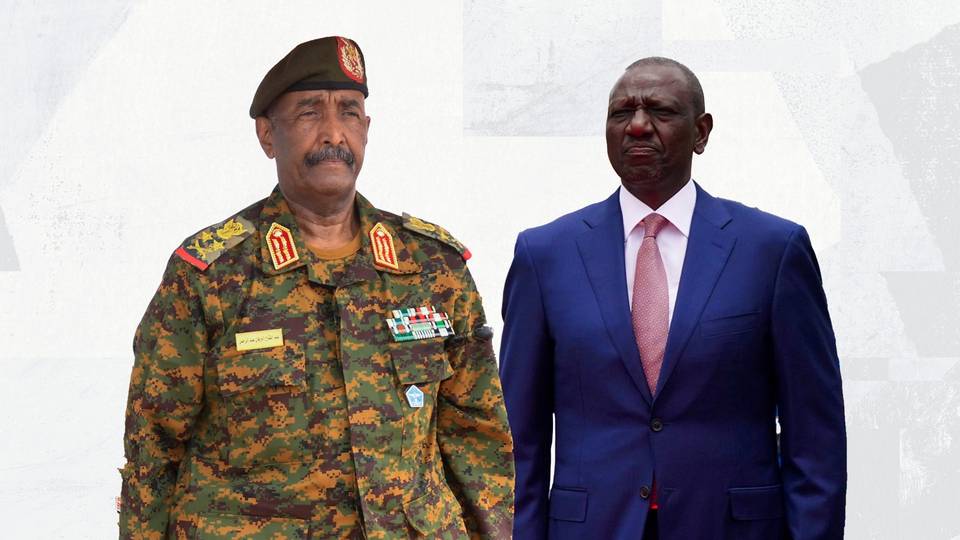Sport
Dollar
38,1743
0.47 %Euro
43,6873
0.23 %Gram Gold
4.079,3900
0.39 %Quarter Gold
6.720,2300
0 %Silver
39,9500
0.44 %The Ankara Declaration has been hailed as a significant move for fostering the security of the Horn of Africa region and the Red Sea.

By Emmanuel Onyango and Tugrul Oguzhan Yilmaz
Piece by piece, Türkiye mediation efforts laid the groundwork for rapprochement between Somalia and Ethiopia that led to a landmark agreement.
It resolved a year-long stalemate sparked by Addis Ababa's deal with Somalia's breakaway region of Somaliland for access to the Red Sea, which angered Mogadishu and ignited tensions across the region.
On Wednesday, Türkiye's President Recep Tayyip Erdogan hosted Ethiopia's Prime Minister Abiy Ahmed and Somalia's President Hassan Sheikh Mohamud in the Turkish capital, Ankara, for a seven-hour meeting.
In the end, both Prime Minister Abiy and President Hassan Sheikh Mohamud agreed to respect each country's sovereignty and to ensure Ethiopia's access to the sea.
The deal between the two neighbours has now calmed fears of a wider regional conflict in the Horn of Africa. The United Nations, African Union (AU) and a regional bloc in East Africa, Intergovernmental Authority on Development (IGAD), welcomed the pact and congratulated Türkiye for its mediation efforts.
Chairperson of the African Union Commission, Moussa Faki Mahamat, has hailed President Tayyip Erdogan "for his support to the two parties in their shared commitment to resolve their differences through consultation and dialogue."
The United Nations termed it a "positive move" in the spirit of "friendship" and "mutual respect". "We also express our appreciation to the efforts by Türkiye for bringing these two countries together, the leaders of these two countries together and in their support for the implementation of the agreement," UN spokesperson Stephane Dujarric said.
Workneh Gebeyehu, executive secretary of IGAD, expressed his gratitude to Turkish President Recep Tayyip Erdogan for his instrumental role. He emphasised the importance of "such diplomatic efforts in addressing shared challenges and fostering stability and prosperity in the Horn of Africa."

What was agreed?
Tensions between the two East African neighbours erupted in January 2024 after Ethiopia agreed to lease 20 km (12 miles) of coastline from Somalia's breakaway region of Somaliland. In exchange, Addis Ababa offered to recognise Somaliland’s claim of being an independent state.
Turkish Foreign Minister Hakan Fidan initiated mediation through the Ankara Process in July 2024, holding comprehensive talks with Ethiopian and Somali delegations.
Detailed discussions addressed the sensitivities that both countries defined as red lines. Türkiye's relentless diplomatic efforts yielded results in finding common grounds, with the Turkish President Erdogan hosting leaders of the two countries this week and an agreement signed in Ankara.
In the Ankara Declaration announced on Wednesday night, Somalia's territorial integrity, unity and sovereignty was affirmed. Ethiopia's access to the sea for trade was also guaranteed based on Somalia's sovereignty.
"It marks a significant achievement in Türkiye's foreign policy. After nearly six months of intensive efforts, reaching a successful conclusion is immensely important not only for Türkiye, Somalia, and Ethiopia but also for the security of the Horn of Africa and the Red Sea. This development also holds the potential to impact global security," Tunç Demirtaş, an expert in Türkiye-Africa relations at Mersin University and a foreign policy researcher at SETA Foundation, told TRT Afrika.

Tensions de-escalated
Tensions between Somalia and Ethiopia had sparked fears of a wider regional conflict involving other countries. Attempts by East African nations, namely Kenya and Uganda, to deescalate the tensions between Somalia and Ethiopia were largely unsuccessful.
The Ankara process stipulates that technical delegations from Somalia and Ethiopia will begin negotiations facilitated by Türkiye no later than February 2025 and complete these negotiations within four months.
The two countries also declared their commitment to resolving any disputes on the agreement through dialogue and, if necessary, with Türkiye's support.
"(The agreement) has de-escalated tensions in the region and prevented a potential conflict. Türkiye, as a country with strong strategic, diplomatic, and economic ties to both Somalia and Ethiopia, holds a unique position in the process," said Demirtaş.

Türkiye's role
Türkiye's decision to step in and play the role of a facilitator of talks between Somalia and Ethiopia underlined its long-standing ties with both sides. It also signalled confidence in Ankara's mediation efforts - which was crucial to achieving a breakthrough in the talks.
President Erdogan expressed his satisfaction with the agreement, wishing that the peace, prosperity, and stability achieved in the Horn of Africa region would serve as an example to other tense regions around the world.
"There is still much to be done. However, there is now an important agreement in place that provides hope for the future. This situation significantly consolidates Türkiye's influence in the Horn of Africa," said Demirtaş.
"Türkiye's strengthened image as a reliable actor and partner may lead to increased expectations for its involvement in resolving disputes," he added.
Both Ethiopia and Somalia have enjoyed long-standing ties with Türkiye, including in economic, social, and security areas.
"We have to talk about the historical relationship between Somalia and Türkiye, which goes beyond the current Republic of Türkiye and back to the Ottoman Empire," Somalia's Foreign Minister, Ali Omar told TRT Afrika ahead of the talks in Ankara.

‘’Since 2011, when President Erdogan, then the prime minister of Türkiye, visited Somalia, the relationship between the two countries has been growing very fast,’’ Omar said.
"Türkiye has helped Somalia in many fronts, including security, development, and also in the oil sector,’’ he added.
The fact that Türkiye does not have a colonial past cements the trust of these two African countries in the push for "African Solutions to African Problems", Fatma Yildiz, an expert in African Studies at Cape Town University, told TRT Afrika.
"Ethiopia has a growing population and a developing economy, and it faces the challenges of being a landlocked country heavily reliant on the port of Djibouti for its trade. For this reason, facilitating access to the sea is a priority for Ethiopia. On the other hand, Somalia has long-standing concerns about its own territorial integrity in relation to Ethiopia,” she said.
“This declaration is a success for the people of Ethiopia and Somalia, for the relations between Türkiye, Ethiopia, and Somalia, and for resolving conflicts in the Horn of Africa and the entire continent in general."
➤Click here to follow our WhatsApp channel for more stories.
Comments
No comments Yet




















Comment